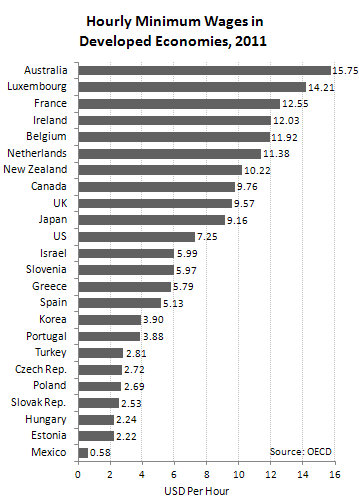The Minnesota legislature is currently debating a bill that would increase the minimum wage to $9.50. Recently the president increased the minimum wage for federal contractors to $10.10.
The problem is that the current minimum wage isn't a living wage — especially if you have a family to support. Many minimum wage earners have to turn to the government safety net — public housing assistance, food stamps, Medicaid, home heating assistance, earned income tax credit, etc. — to be able to survive.
By not paying their employees enough to live on, companies are getting subsidies from the government to keep their costs down, and therefore increase their profits. This is corporate welfare, at the taxpayers' expense.
The minimum wage hasn't kept up with inflation; in adjusted dollars it pays far less than when it was first introduced. If the minimum wage had kept pace with worker productivity, it would be $18. The United States has one of the lowest minimum wages among developed economies: $7.25, compared to $9.25 in Japan, $9.57 in the UK, $9.76 in Canada, etc., up to $15.75 in Australia (in 2011, some of these have increased since then).
Opponents of an increase to the minimum wage are slowly yielding to logic, but they still want an exception: a lower minimum wage for workers under 18.
Yes, they want child slaves.
They justify this in a number of ways. "Kids don't have any responsibilities, they don't have to pay any rent, buy food or support children." Or, "Kids don't really need money. They just need a little pocket change to pay their cellphone bills and buy a t-shirt every once in a while." Or, "Kids are so unreliable, I have to train them to get to work on time, they're not worth that much."
The reality is that there are plenty of kids who do have real responsibilities. They have to help their parents — often single moms — pay the rent, buy their own and their siblings' food. But those aren't rich suburban white kids, so they fall beyond the ken of the people who oppose the minimum wage increases.
When I was in school I "lent" my dad money — the real estate market was a bear in the seventies — so I can attest to the fact that kids really do give their parents money, even white kids.
I don't mean to denigrate suburban white kids — they need money too. Have you looked at the cost of college these days? College students are frequently saddled with onerous amounts of debt after four years of tuition — colleges are really expensive these days. The more money they can save before they go to college, the less they'll have to borrow.
The silliest canard is "I have to train them to get to work on time." The average 16-year-old has been going to school for a decade, and has been getting up at 6:00 AM, turned in hundreds of homework assignments on deadline. Many have participated in hundreds of team practices and critical matches, where the success of their team hinged on their actions. They have been dealing with the whims and demands of parents, teachers and coaches their whole lives. It's preposterous that employers think they are teaching these kids anything they haven't been exposed to a thousand times before.
It's a fact: a lot of kids are unreliable. Just like a hell of a lot of adults. They know what they're supposed to, and when they're supposed to do it. If they can't do the job on time or to your satisfaction, just fire them. Why should the good workers get paid less just because you have problems with the bad workers? Firing them may be the best lesson you can give them.
But if you can pay workers peanuts and invest nothing in them, you don't really care how bad they are, just as long as you can get a minimum amount of effort out of them. Yes, raising the minimum wage will result in some job losses: bad employees who aren't worth what they're being paid will be fired. You will get more work out of your good employees because they'll be more motivated. These are good things: unemployment is still too high, and there are plenty of people who need jobs and are willing to work hard.
Businesses that have good employees making a higher minimum wage will either have to cut their own profits or executive compensation packages (I'm looking at you, Walmart), or raise prices. Companies will have to charge prices for products that reflect the cost of producing them in an economy where everyone can afford to live on what they get paid, instead of depending on the government to step in and prop them up.
Some small number of businesses will fail, because their owners aren't competent to compete without screwing over their employees, or because they're selling products that no one is willing to buy for what it costs to make them — that is, they have a failed business model.
In either case, what's the problem? Those companies are just the corporate version of bad employees.

No comments:
Post a Comment